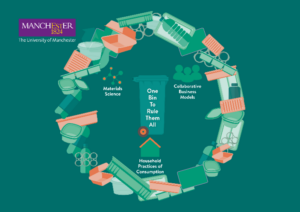World leading ‘One Bin to Rule Them All,’ developed with Greater Manchester citizens
 Thirty households in Greater Manchester have supported world leading research on waste. The ‘One Bin to Rule Them All’ project focused on one area of the city chosen because of its socio-economic diversity (Indices of Deprivation, 2019). The research looked at how plastic recycling, particularly of household waste, can be simplified. This three-year interdisciplinary project has taken a holistic approach to the plastics supply chain, working with industry, policy, and importantly households, to better understand plastic recycling.
Thirty households in Greater Manchester have supported world leading research on waste. The ‘One Bin to Rule Them All’ project focused on one area of the city chosen because of its socio-economic diversity (Indices of Deprivation, 2019). The research looked at how plastic recycling, particularly of household waste, can be simplified. This three-year interdisciplinary project has taken a holistic approach to the plastics supply chain, working with industry, policy, and importantly households, to better understand plastic recycling.
As part of testing the One Bin system, University researchers used a ‘disruptive’ trial. This involved giving the households an additional 240 litre bin to put anything they identified as plastic in. Working closely with the residents the study looked at the items collected and the residents’ experiences of recycling.
The research helped inform potential decisions that could be made in Material Recycling Facilities (MRF) and Plastic Recycling Facilities (PRF), identifying pathways that promise to maximise the value and sustainability of materials. In addition to working with residents the teams used their state of the art labs to evaluate the recyclability of different types of packaging and related rates degradation.
The research report identifies that a core problem is a lack of standardisation across UK waste infrastructure. In the UK there are over 391 different local authorities, with an estimated 39 different bin regimes. This is coupled with approximately 3,500 waste recycling plants – with varying capacities and capabilities in infrastructure creates lots of complexity for consumers. In other words, one plant might need you to take the lids off your plastic bottle whilst another would prefer you to leave them on!
Add to this the huge variety in packaging types, the many different polymer types used to make them, alongside colouring, additives and labels to contend with and standardising the waste system becomes much more challenging.
The report findings come at an important time for UK plastics policy. As the urgency to find a solution to the problem of plastic waste becomes more apparent, so several policies are being rolled out to try to tackle the issues. These include policies which place more emphasis on plastic producers such as the Plastic Packaging Tax, or Extended Producer Responsibility (EPR), alongside a focus on consumers through Deposit Return Schemes (DRS) where consumers will be paid to return plastic bottles. There is also work being done to improve consistency in kerbside collections with local authorities and also a proposed ban on the export of plastic waste by 2027.
In addition to working with Policy@Manchester to share the findings the team met with Manchester’s Executive Member for Vibrant Neighbourhoods and have offered to work with Manchester’s teams to help them tackle the issues of recycling fly tipping in the city.
